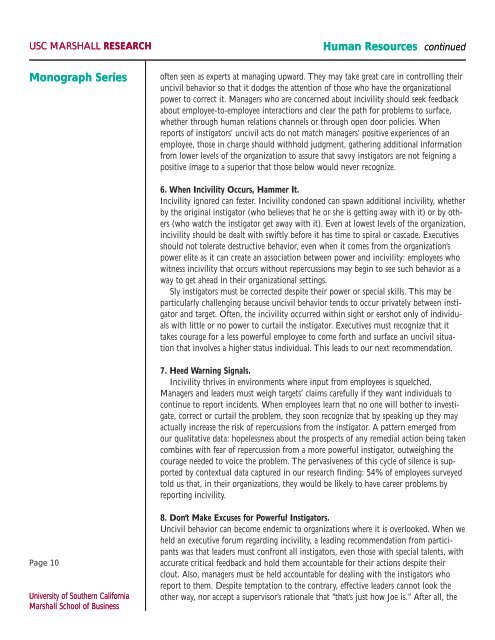On the Nature, Consequences and Remedies of Workplace Incivility
On the Nature, Consequences and Remedies of Workplace Incivility
On the Nature, Consequences and Remedies of Workplace Incivility
You also want an ePaper? Increase the reach of your titles
YUMPU automatically turns print PDFs into web optimized ePapers that Google loves.
USC MARSHALL RESEARCH Human Resources continued<br />
Monograph Series<br />
Page 10<br />
University <strong>of</strong> Sou<strong>the</strong>rn California<br />
Marshall School <strong>of</strong> Business<br />
<strong>of</strong>ten seen as experts at managing upward. They may take great care in controlling <strong>the</strong>ir<br />
uncivil behavior so that it dodges <strong>the</strong> attention <strong>of</strong> those who have <strong>the</strong> organizational<br />
power to correct it. Managers who are concerned about incivility should seek feedback<br />
about employee-to-employee interactions <strong>and</strong> clear <strong>the</strong> path for problems to surface,<br />
whe<strong>the</strong>r through human relations channels or through open door policies. When<br />
reports <strong>of</strong> instigators’ uncivil acts do not match managers’ positive experiences <strong>of</strong> an<br />
employee, those in charge should withhold judgment, ga<strong>the</strong>ring additional information<br />
from lower levels <strong>of</strong> <strong>the</strong> organization to assure that savvy instigators are not feigning a<br />
positive image to a superior that those below would never recognize.<br />
6. When <strong>Incivility</strong> Occurs, Hammer It.<br />
<strong>Incivility</strong> ignored can fester. <strong>Incivility</strong> condoned can spawn additional incivility, whe<strong>the</strong>r<br />
by <strong>the</strong> original instigator (who believes that he or she is getting away with it) or by o<strong>the</strong>rs<br />
(who watch <strong>the</strong> instigator get away with it). Even at lowest levels <strong>of</strong> <strong>the</strong> organization,<br />
incivility should be dealt with swiftly before it has time to spiral or cascade. Executives<br />
should not tolerate destructive behavior, even when it comes from <strong>the</strong> organization’s<br />
power elite as it can create an association between power <strong>and</strong> incivility: employees who<br />
witness incivility that occurs without repercussions may begin to see such behavior as a<br />
way to get ahead in <strong>the</strong>ir organizational settings.<br />
Sly instigators must be corrected despite <strong>the</strong>ir power or special skills. This may be<br />
particularly challenging because uncivil behavior tends to occur privately between instigator<br />
<strong>and</strong> target. Often, <strong>the</strong> incivility occurred within sight or earshot only <strong>of</strong> individuals<br />
with little or no power to curtail <strong>the</strong> instigator. Executives must recognize that it<br />
takes courage for a less powerful employee to come forth <strong>and</strong> surface an uncivil situation<br />
that involves a higher status individual. This leads to our next recommendation.<br />
7. Heed Warning Signals.<br />
<strong>Incivility</strong> thrives in environments where input from employees is squelched.<br />
Managers <strong>and</strong> leaders must weigh targets’ claims carefully if <strong>the</strong>y want individuals to<br />
continue to report incidents. When employees learn that no one will bo<strong>the</strong>r to investigate,<br />
correct or curtail <strong>the</strong> problem, <strong>the</strong>y soon recognize that by speaking up <strong>the</strong>y may<br />
actually increase <strong>the</strong> risk <strong>of</strong> repercussions from <strong>the</strong> instigator. A pattern emerged from<br />
our qualitative data: hopelessness about <strong>the</strong> prospects <strong>of</strong> any remedial action being taken<br />
combines with fear <strong>of</strong> repercussion from a more powerful instigator, outweighing <strong>the</strong><br />
courage needed to voice <strong>the</strong> problem. The pervasiveness <strong>of</strong> this cycle <strong>of</strong> silence is supported<br />
by contextual data captured in our research finding: 54% <strong>of</strong> employees surveyed<br />
told us that, in <strong>the</strong>ir organizations, <strong>the</strong>y would be likely to have career problems by<br />
reporting incivility.<br />
8. Don’t Make Excuses for Powerful Instigators.<br />
Uncivil behavior can become endemic to organizations where it is overlooked. When we<br />
held an executive forum regarding incivility, a leading recommendation from participants<br />
was that leaders must confront all instigators, even those with special talents, with<br />
accurate critical feedback <strong>and</strong> hold <strong>the</strong>m accountable for <strong>the</strong>ir actions despite <strong>the</strong>ir<br />
clout. Also, managers must be held accountable for dealing with <strong>the</strong> instigators who<br />
report to <strong>the</strong>m. Despite temptation to <strong>the</strong> contrary, effective leaders cannot look <strong>the</strong><br />
o<strong>the</strong>r way, nor accept a supervisor’s rationale that “that’s just how Joe is.” After all, <strong>the</strong>


